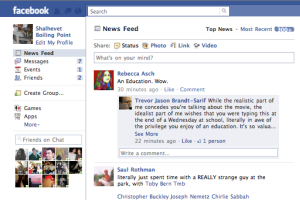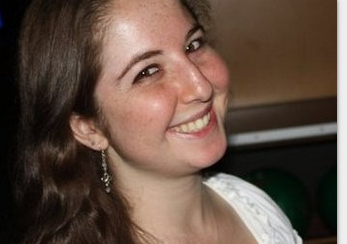Slapped in the Facebook … and other things that can go wrong when social media isn’t just social

January 7, 2011
Since Facebook has become such a dominant part of modern society, it’s easy to see why people have started using the website for purposes other than fun or communication.
And why wouldn’t they? Facebook combines the services of e-mail, instant messages, photo sharing sites and everything you’ll ever need to know about your “friends” — not just facts like birthdays and hometowns, but their moment-to-moment activities and thoughts — in one website.
It becomes problematic, though, when the people who are looking you up on Facebook have a major impact on your future.
Take a look at an average high school senior in September. To prepare for college, besides writing dozens of essays, filling out endless forms, and touring schools nearby, many teenagers feel obligated to delete or edit their Facebooks.
“Before I applied, I combed through my profile to delete any questionable content,” said senior Zev Hurwitz. “Now I’m being really careful to keep everything clean. You never know who is looking.”
However, nobody is sure what actually happens in regards to Facebook during the college application process. A popular question that’s come up recently is this: do colleges really search applicants on Facebook, or is this just an urban legend?
“A new survey of 500 top colleges found that 10 percent of admissions officers acknowledged looking at social-networking sites to evaluate applicants,” said The Washington Post in 2008.
“Of those colleges making use of the online information, 38 percent said that what they saw ‘negatively affected’ their views of the applicant. Only a quarter of the schools checking the sites said their views were improved, according to the survey by education company Kaplan.” (http://tinyurl.com/BPFacebook2)
Director of College Counseling Dr. Steven Mercer, however, thinks that the vast majority of colleges won’t have time to do extra research on every applicant. He says there are no official policies in regards to social networking sites, and colleges are very clear in their applications about what they want in a student.
“It’s become kind of a mix of urban legend and some truth,” Dr. Mercer said. “With the rise of things like Facebook, it’s not unheard of that a college admissions officer will look someone up. If there’s something really egregiously bad, it might come to the attention of an admissions officer.”
But that means that the school would have to be searching you in the first place.
“If you go for a college interview,” Dr. Mercer continued, “you dress respectably because it’s common sense. To me it’s common sense to be mindful of what might come across an admissions officer’s desk.”
Internet safety expert Vanessa Van Petten, who presented an extended Town Hall on the subject of Internet safety Dec. 16. Ms. Van Petten, worked with the admissions officers at Emory University, her personal job being to search applicants on Facebook.
“Every college has a different policy,” said Ms. Van Petten, creator of www.radicalparenting.com, in an interview after her talk. “I’ve heard colleges that say they don’t have time for it and some that say they like to do that.”
Even if it’s rare, if it happens at all it means having a page is rolling the dice.
Whether or not colleges care about unbecoming information found on Facebook or MySpace pages, regular people do, and lately it has started affecting political races. Take the case of Krystal Ball, a Democrat Congressional candidate from Virginia, who lost this past election after a picture of her from a party six years ago started circulating during her campaign. In the picture, she was dressed in skimpy lingerie and acting lewdly with a toy.
“I think I was the No. 3 most-Googled term in the whole world over some stupid gag I played when I was 22 years old,” Ms. Ball said in a phone interview with the Times on the day after she lost. (http://tinyurl.com/BPFacebook4)
The same New York Times story reported that Representative Aaron Schock of Illinois, Senate candidate Christine O’Donnell of Delaware, Republican Congressional candidate Blake Farenthold of Texas, and Republican Congressional candidate Rich Lott of Ohio all had to explain why they were posing for inappropriate pictures that were revived from years-old Facebook albums.
“With so many examples to point to already,” said the article, by Jeremy Peters and Brian Stelter, “could this mean that drunken Facebook photos of the presidential candidates of 2024 and of the Supreme Court justice nominees of 2040 are already out there?”
Another way Facebook has begun to harm people in the real world is when they apply for a job. A prospective employer has a lot less information to sift through than a college admissions officer, and it is quite possible he or she will look up a potential employee online before giving away the job.
“In America, the monitoring of social networking sites for content that may interest employers and officialdom is now so routine that software is being put on the market that will automate the process,” said an article in The Independent in 2008. (http://tinyurl.com/BPFacebook1)
Perhaps even more important than college admission or employment, it’s now common to find evidence — from wall posts incriminating cheating partners to pictures of underage drinking — brought from a social networking site into court cases.
A Star News Online article on the subject of lawsuits involving Facebook quotes William T. Batchelor II, from the law firm Carolina Legal Associates, as saying, “The Internet has changed 100 percent how domestic work is done. The Internet does what it’s supposed to do; it exposes the truth. It’s written generally by the person who says they didn’t do it. There’s nothing left to talk about.” (http://tinyurl.com/BPFacebook5)
According to the American Academy of Matrimonial Lawyers, 66 percent of their survey’s respondents counted Facebook as the top resource for evidence in divorce cases.
“Whether it’s lawyers mining social networking sites for information or clients printing out their spouse’s dalliances from a Facebook page to give to lawyers, what’s online can help link the pieces of a case together,” continued the article. (http://tinyurl.com/BPFacebook3)
Laura Mandel, an attorney at Wasser Cooperman & Carter in Century City, said she has not seen much use of Facebook in her own cases yet. But it has affected what people know about their parents, for example, during strained times in family life.
“I’m sure it has been used as bits and pieces of evidence, but [I haven’t seen Facebook] in the litigation,” said Mrs. Mandel, mother of senior Ben and sophomore Rebecca Mandel. “But I have in terms of people seeing photographs of their father, who was getting divorced, in different locations because of Facebook. Someone was out of town during certain periods of time and that was found out through Facebook.”
In addition, she expects the use of Facebook in court to rise in the near future.
As the realization that so much personal information can be accessed by so many kinds of people has begun to filter into students’ consciousness, some are starting to think twice about having a Facebook or allowing their kids to sign up. In addition, publicity about the problem has raised suspicions about Facebook’s security and privacy in general.
“Privacy on Facebook?” said Director of Technology Mr. Yossie Frankel, bursting into laughter. “From time to time Facebook has problems, where their security doesn’t work the way it’s supposed to.
“You read about it in the papers — ‘oops!’ says Facebook. Well, that ‘oops’ has allowed [hackers to set up] ‘crawlers’ to crawl through all these little ‘oopses’ and take a [screenshot] image of them, which are then stored and shared on hacker sites.”
Mr. Frankel recounted a story recently in the news about a man who exploited such holes and posted them on his website to show the perils of Facebook. He couldn’t be sued, however, because his crawler went through and “stole” public domain — which is why it wasn’t stealing.
Just because you have it set to private, Mr. Frankel explained, doesn’t mean Facebook has set it to private, and the man wasn’t actually breaking any law.
What happens if you post a picture or status on Facebook and then “delete” it? That information could still be stored somewhere, purposely saved by hackers or randomly by general computer archives, he said.
“It can still exist, but it doesn’t mean it does exist,” said Mr. Frankel. “Let’s say you have all your privacy settings set perfectly and then you delete something. Facebook does keep a little history and images of these sort of things, but after awhile it disappears. The problem is… if someone else gets it, it can be archived.”
There’s no denying that the cultural life of the average teenager has changed drastically in the past three generations. Our parents had e-mail, the content of which could only be seen by the sender and recipients. Before that, our grandparents had letters, which were even safer.
If the letters were kept in a safe place, there would have been no way for the message to reach anyone unintended – plus they could be thrown out at will, or even burned in the fireplace.
“There were no fears in those days, it was a much safer and naive time to grow up in,” said Art and Performing Arts Department Chair Roen Salem, who remembers exchanging letters in the 1970s.
“I have letters from my husband from Vietnam, he wrote he everyday.” Roen said. “I have letters in my fathers handwriting and they remind me of him even though he died 35 years ago; I have holiday cards from my grandparents I still look at. Most of them are in storage and I don’t look at them very often, but I do every few years and I get a big kick out of it.”
The difference between a letter and Facebook is that once you throw out a letter, it’s gone forever; but even if you delete something you post on Facebook, it might never actually go away.
The question, perhaps, is how much you care.
This story won a National Award in Feature writing in the 2011 International Writing and Photo Contest of the Quill and Scroll Society.













